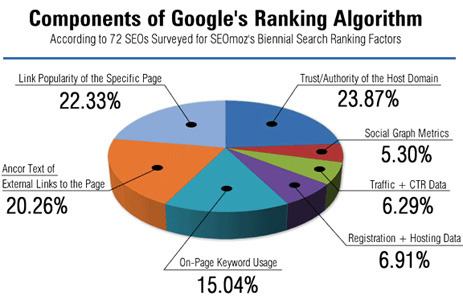How Does Google Rank Websites
Introduction
One of the more frequent questions that we are asked is “how do I get on the first page of Google?” It seems like a sensible smart question and of course, we would always aim to help your website achieve just that. However, this article will explain why that question is so hard to answer and also why it is not the best question to ask at all. Confused? Then keep reading.
How Does Google Work
The answer to this question is of course the holy grail when it comes to web design and web marketing. We all want to rank as high as possible and Google must decide, amongst the millions of web pages it crawls every hour, which should appear and in what order. Unfortunately, unless you work in the inner realms of Google, you will never find out the answer. Luckily, many people attempt to reverse engineer search results to try to build a model of how Google probably works. We shall summarize their findings.
Search Ranking Factors
The top 5 factors that determine your website’s Google page ranking are, according to the leading search engine optimization (SEO) experts:
- Keyword focused Anchor Text from external links – this means that when a website links to your website, the visible words contained in the link tell Google what your website probably contains.
- External link popularity – This means that Google ranks your site depending on the quality and quantity of the external links pointing to your site.
- Diversity of link sources – This means that the more domains (the addresses of websites) that link to your site the better; many links from the same source do not help as much as one link each from lots of differnet sources.
- Keyword use in the title tag – The title tag (usually right at the top of your browser window when you are looking at a website) tells Google what your page should be about and it appears that Google cares more about the keywords in the title than about the keywords on your pages.
- Trustworthiness of the domain – Google attempts to rate your domain for trustworthiness, based on various sources, including where it is hosted (it can be affected by other domains on the same hosting).
How Do Those Ranking Factors Affect My Site?
If you notice, 4 of the top 5 ranking factors have nothing, in principal, to do with the actual content of your website; they are all based on external links to your website instead. Upon inspection, it is clearly a better model for Google if it judges your website based on how it is viewed by other websites. The more “trusted” and higher-ranked websites that link to your website the better; it is akin to asking “around town” for who is recommended when it comes to a particular job.
One misconception is that there is a “magic formula” when it comes to website design in terms of how it affects your Google ranking. To be sure, the overall design of a website should follow Google’s best practises, included having correct title tags, meta descriptions and meta keyword tags. All images should have an alt tag (some text to show if the image is missing or is not displayed on the user’s browser). There should be no dead links (links that go nowhere). However, looking at the ranking factors, it is much more beneficial, once the website has been constructed properly, to spend time (and sometimes money) on promoting it to as many good websites as possible.





 Follow
Follow





